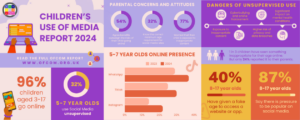Ofcom’s Children’s Use of Media Report Highlights
Navigating the Digital Playground: Insights and Recommendations for Children’s Social Media Use ![]()
In an increasingly digital world, children’s interaction with social media has become inevitable and often begins at a surprisingly young age. The latest report by Ofcom (Click Here) highlights several important trends and concerns, as well as valuable guidance for parents.
Key Statistics on Children’s Social Media Use:
- Extensive Reach: 96% of children aged 3-17 are online, with social media use spiking significantly after the age of 12.
- Unsupervised Use: A third of parents of 5–7-year-olds reported that their child uses social media independently, with a further 42% saying that they used these services with their child.
- Potential Risks: 51% of children aged under 13 – which is commonly the minimum age requirement for many social media platforms – report using social media sites/apps. This number has increased from last year.
Risks Associated with Unsupervised Social Media Use:
- Exposure to Inappropriate Content: Many children encounter content that is not age-appropriate, including potential exposure to harmful material.

- Online Bullying and Harassment: Social media can be a vehicle for bullying. A significant number of children report mean or hurtful interactions.

- Privacy Concerns: Children may not fully understand privacy settings or the consequences of sharing personal information.

- Impact on Mental Health: Pressure to gain popularity and likes can adversely affect children’s mental health and self-esteem.

Parental Guidelines to Mitigate Risks:
- Open Communication: Regularly discuss online experiences and safety with your children. Encourage them to share their concerns and experiences.
- Educate on Privacy and Security: Teach children about the importance of privacy settings and the risks of sharing personal information.
- Set Boundaries: Use parental control tools to set appropriate limits on what content can be accessed and for how long.
- Encourage Critical Thinking: Help children develop skills to critically assess the information they find online, distinguishing between real and fake news.
- Monitor and Participate: Where possible, join your child in their digital exploration. This not only helps in monitoring their activities but also in understanding their interests.
The digital age offers numerous opportunities for learning and connection, but it also comes with its challenges. By staying informed and proactive, parents can ensure that their children reap the benefits of social media while minimising its risks. This approach will cultivate a safer and more rewarding online environment for our youngest digital citizens.
Here are some recommended resources:
Police Scotland, Social Media Guidance for Parents & Carers
UK Safer Internet Centre
Homepage – UK Safer Internet Centre
Contains easy-to-understand summaries of many online issues facing children today, guides and resources (See links below) and resources for Safer Internet Days from 2017 to 2024.
Parents and Carers – UK Safer Internet Centre
This page includes various links for parents about discussing and modelling positive online behaviour.
Children and young people – UK Safer Internet Centre
Videos, guides and activities aimed at 3-to-11 year-olds and 11-to-19 year-olds.
Grandparents – UK Safer Internet Centre
A brilliant range of resources to help grandparents better understand online dangers while supporting their grandchildren.



You must be logged in to post a comment.